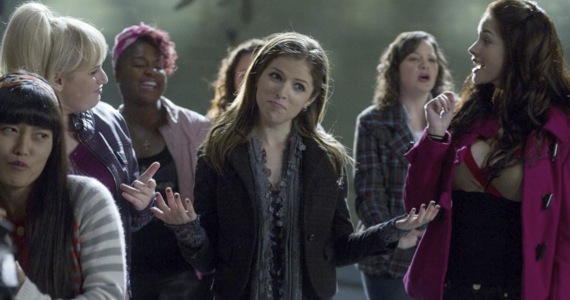|
The
Bellas are an
all-female a capella group from Barden University who crashed out of
the last
International Championship of Collegiate A Capella after one of their
singers, Aubrey
(Anna Camp), threw up all over the first row of audience members in
mid-song.
Their disgraceful exit was made all the more unbearable by the fact
that their
brother group and bitter rivals, The Treble Makers, outshined them in
that same
competition. Now in the new year, with Aubrey leading, the Bellas carry
out a
recruitment drive to assemble a group that
can make them genuine contenders again. The problem is that they have
trouble
finding new people willing to join as a result of their newfound
notoriety and
end up only having a small pool of talent to draw from. Meanwhile, Beca
(Anna
Kendrick), a freshman loner, treats university life with contempt. She
only
attends Barden because her father, a literature professor there, forces
her.
She thus insulates herself from campus life
by interning at the university’s radio station. Her dream is to move to
L.A.
where she aims to be a DJ. Her father realises that she’s been cutting
class
and offers to let her move to L.A. providing that she first join a club
and get
more actively involved in the university’s
activities. This leads her to successfully auditioning for
The Bellas and
teaming up with a bunch of characters that includes a low-talking
Asian, Lily
(Hana Mae Lee), an obese bogan, “Fat Amy” (Rebel Wilson), and a butch
African-American
lesbian, Cynthia-Rose (Ester Dean). Together, this seemingly mismatched
group
of songstresses prepares for the
upcoming competition.

If
you’re searching
for a simple popcorn flick that can make your blood rush, Pitch
Perfect fits the brief. The entertainment that the film
provides, as one would predict, comes from its humorous depiction of
the
individuals that form The Bellas, the catchy arrangements they perform
and their
being pitted against other formidable a capella groups in competition.
At its
best, the film can make you quiver with the sort of ecstatic excitement
that
Glee’s music often inspires. Unfortunately,
most of the film suffers from a lack of thought, control and cohesion.
Its screenplay
repeatedly and shamelessly exploits shallow cultural stereotypes for
empty
laughs, for instance inserting tedious jokes about the social
awkwardness of
the story’s Asian characters and one-liners from “Fat Amy”. The
characters are
lazily drawn. Beca is particularly boring and lacking in charm, and
she’s one
of the lead characters! It gets worse. Moore mismanages the material so
terribly that the Bellas’ ultimate song in the competition finals is
much less
exciting than their version of Bruno
Mars’ “Just the Way You Are”,
which was merely an improvisational group exercise that they did
outside the
competition. Moore then immediately follows up this anti-climax with
another when
he decides to distinguish this film from the similar films before it by
omitting
the scene where the winner of the competition is announced and
celebrates – the
cheesy scene that everyone excitedly waits for. Stupid. All in all, Pitch Perfect won’t manage to sustain
your interest for its entire duration but it is fairly watchable.
|